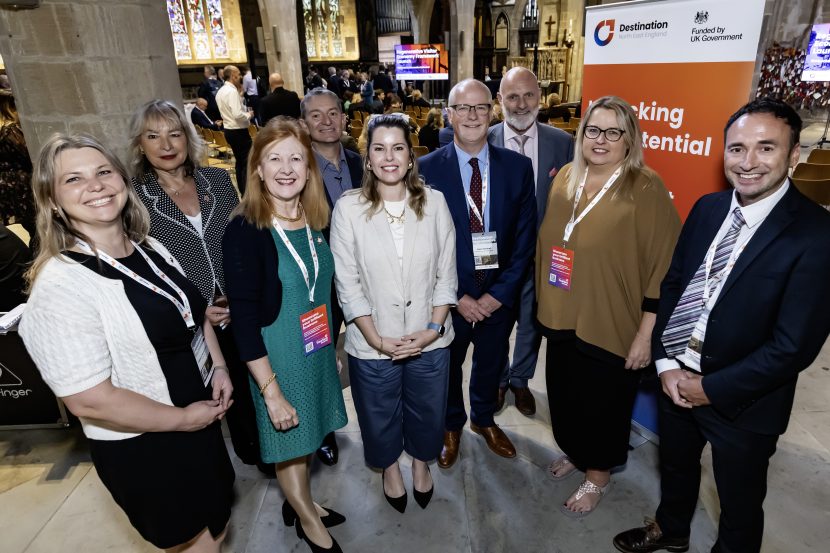North East Mayor Kim McGuinness and leaders from the region’s local authorities joined forces with the area’s visitor economy to welcome the extensive framework, unique to North East England, to empower industry and government to positively impact our place, people and planet.
This framework has been delivered and developed by leading regenerative tourism experts Global Destination Sustainability Movement (GDS-Movement) on behalf of Destination North East England. It has been co-created with over 200 stakeholders from across the industry for Local Visitor Economy Partnerships (LVEPs), local authority tourism teams, and other organisations engaged in destination management, to create strategies that will support the visitor economy on its regenerative journey.
Going far beyond traditional sustainability thinking, the framework examines what a regenerative visitor economy would look like for the North East, centred around core pathways that deal with decarbonisation and responding to climate challenges, local supply chain innovation, investment in people and place, connecting communities and the restoration of nature, landscapes, culture and heritage.
At the launch event, delivered in partnership with North East Combined Authority and Net Zero North East England, and attended by the advisory board and senior figures from the national tourism body VisitEngland, leaders came together to support the framework and the work of the regenerative tourism steering group who will now set about implementing the principles of the framework with support from a dedicated taskforce as the work of Destination North East England, the first Destination Development Partnership Pilot in the country, informs the regional and national conversation.
All aspects of the event were organised with the principles of regenerative tourism in mind. Everything from locally sourced beers from Fenwick to soft drinks created from surplus and wonky fruit from Flawsome, kindly donated by all-electric train company Lumo, the event was carefully designed to put regenerative thinking into action.
Organisers chose a venue close to sustainable travel options and an entirely vegan menu to reduce waste and carbon impact, catered by Café 16 which is staffed by a team of prison leavers who are trained, mentored, and led by charity the Oswin Project. The event was rounded off by a performance from LGBTQIA+ community choir Northern Proud Voices.
The visitor economy in North East England is worth £6.1bn and currently supports more than 63,000 jobs. However, it still has the lowest number of domestic and international visitors of all English regions. In parallel with the region’s trailblazing devolution deal, Destination North East England has been a catalyst for change and has provided the foundations for a ten-year plan that will double the size of the visitor economy in the next ten years.
The recommendations in the framework are already being implemented by Destination North East England and its delivery partners to inform their business support and visitor economy development plans, influencing the region’s 10 year visitor economy strategy and unlocking opportunities for businesses like fully-funded Green Tourism membership and support to achieve globally recognised sustainability certifications.
The framework has also influenced a series of ambassador toolkits for conference organisers to attract major business events that have regenerative practices at their heart, as well as informing the work of Destination North East England’s Everybody Welcome programme – helping to make the North East a welcoming, inclusive and accessible destination for every visitor.
Figures from Booking.com show a significant shift towards a more climate considerate, socially conscious and impact aware market. Searches for ‘sustainable holidays’ have increased by over 191% on Google since 2019 and 75% of global travellers say they want to travel more sustainably. Given the region’s cherished natural resources, welcoming and inclusive reputation and cultural heritage, North East England is in a prime position to unlock this opportunity aligning with the principles set out in the framework to ensure its long-term viability and benefits for communities, businesses and the environment.
North East Mayor, Kim McGuinness, said:
“I love the North East, and as Mayor I stood on a manifesto to promote the region on the national and international stage, so the world knows just how fantastic our area is to live, work, study and visit. I want to create more jobs, opportunity and growth for local people, places and businesses in our visitor economy. Its untapped potential is significant and together as a region we have ambitions to double the size our visitor economy by 2034.
However, we must ensure this works for both our planet and our people. This framework will enable us to align and work together to enhance region’s visibility and reputation as a globally welcoming, inclusive and world-class regenerative visitor destination.
Our vision and ambition for the North East’s visitor economy is bold and transformative and we must continue to work together to unlock opportunity and tackle inequalities, so we make the North East the home of real opportunity.”
Councillor Amanda Hopgood, Leader of Durham County Council and portfolio holder for Creative, Culture, Tourism and Sport at North East Combined Authority, said:
“I am so proud to lead the combined authority’s portfolio for tourism – an industry that, through Destination North East England’s work, is proving to be one of the area’s most exciting, innovative and forward-thinking sectors. This regenerative visitor economy framework will be transformative for the millions of visitors who eagerly explore our towns and cities, countryside and coastlines and the locals who are proud to call our wonderful region home.
“Caring for our unique place in the world and our passionate communities, whilst unlocking the opportunity for growth the visitor economy brings, will be vital in ensuring a bright future for North East England.”
VisitEngland CEO, Patricia Yates, said:
“Growing the visitor economy and generating better outcomes for visitors, the environment, communities and businesses is at the heart of VisitEngland’s restructuring of the tourism landscape and it is great to see the North-East launching its Regenerative Visitor Economy Framework. “Setting out its commitment to regenerative tourism and demonstrating how this also makes business sense will support the region’s industry to be resilient, sustainable and world-class, attracting both domestic and international visitors now and in the years ahead.”
Speaking at the launch event, CEO of GDS Movement Guy Bigwood addressed reports of the significant impact over-tourism is having on destinations globally and pushed leaders in the North East to use the framework to affect change.
“This framework is one of the most ambitious regenerative tourism projects delivered globally to date. It provides a robust and holistic set of guidelines and actions that is founded upon the culture, needs and collective ambition the industry and political leaders share for the region. It has been a hugely rewarding co-creation process involving hundreds of passionate people from communities and the tourism industry who are proud of and committed to developing this amazing and forward-thinking destination. Simply put – this project is worldclass!”
John Marshall, Chair of Destination North East, said:
“As England’s first Destination Development Partnership, we knew we had to achieve our ambitions of doubling the value of the visitor economy in a sustainable and considerate manner. This framework is a true reflection on how North East England is leading the way to make sure that tourism and events works for our local communities, our industry and our planet. It truly demonstrates how forward-thinking our region is, and it is great to see universal support from our region’s leaders and our visitor economy. “I would like to take this opportunity to thank the hundreds of stakeholders who have been involved in co-creating this framework, their dedication and commitment has resulted in a piece of work that will pave the way for a sustainable and resilient future for our region.”

